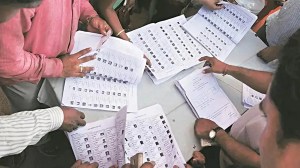Bush to focus on domestic issues
Delivering his first State of the Union address to a Democratic-controlled Congress, President Bush hopes to balance a rebuke of his Iraq policy...

Delivering his first State of the Union address to a Democratic-controlled Congress, President Bush hopes to balance a rebuke of his Iraq policy already promised by lawmakers with a high-profile invitation to cooperate on vexing domestic problems.
In Tuesday night’s speech before a joint session of Congress, Bush plans to dangle ideas — some new, some recycled — on reducing America’s oil dependence and making health care more available, among others. Aware that 2008 presidential contenders and new Democratic leaders present fierce competition for headlines, the president has a much-abbreviated topic list in an attempt to capture the public’s attention.
In the days ahead of the 9 pm EST speech, the White House took great pains to detail its health care portions. The cold reception they received on Capitol Hill offered a striking reminder of the difficulty the president faces in the new political climate.
Bush is proposing to change to how the tax code treats health insurance, by counting employer contributions toward health insurance as taxable income while establishing a standard deduction for anyone with insurance. The White House says it would introduce increased market forces to the health care industry and make coverage more affordable for the uninsured. Aides estimated the plan would represent a tax increase for only about 20 per cent of employer-covered workers.
Bush was not expected to rehash the speech he gave less than two weeks ago laying out his revamped plan for Iraq, the centerpiece of which is a 21,500-troop increase in the US military presence. Instead, he was to broadly defend his stand that Iraq is part of a war on terror that will make Americans safer.
In the House, members of the GOP leadership drafted a series of what they called “strategic benchmarks” and said the White House should submit monthly reports to Congress measuring the Iraqi government’s progress in meeting them.
Meanwhile, majority Democrats intend to hold votes within days in the House and Senate on tougher bills declaring that the troop increase is “not in the national interest.”
The White House has promised the president will be bold. But the broad theme — energy, education, health care, immigration — were familiar and there were no hints of dramatic new initiatives, particularly as war costs and huge federal deficits preclude anything too costly.
The president is expected to address:
• Health care. Bush will propose a tax deduction of $7,500 for individuals and $15,000 for families regardless of whether they buy their own health insurance or receive medical coverage at work. He also would subject employer-sponsored health care benefits to taxation, meaning those with more policies worth more than the deduction would see a tax hike. But those who get policies at work worth less than the deduction, the preponderance of workers with employer-provided insurance, would get a tax break. Another proposal would give some federal money now going to hospitals and other facilities to states for programs to reduce the number of uninsured.
• Energy. Bush is expected to call for a sharp escalation in the federal mandate on use of ethanol as a renewable fuel alternative, a goal that may prove difficult to meet. He also may seek the power to raise fuel economy standards for passenger cars, authority he also asked for last year. Some Democrats worried the plan would give transportation officials overly broad authority to change the system.
• Education. Bush will push for Congress to renew his education accountability law, No Child Left Behind, which expires this year. Democrats will expect him to go along with increases in spending to help schools make the required progress under the law.
Report on US’s status
The State of the Union Address is an annual event in the US in which the President reports on the status of the country to a joint session of the US Congress (the House of Representatives and the Senate). The address is also used to outline the President’s legislative proposals for the upcoming year.
Since 1966, the speech has been followed by a response or rebuttal by a member of the political party opposing the President’s. The response is typically broadcast from a studio with no audience.
–JENNIFER LOVEN



- 01
- 02
- 03
- 04
- 05




























